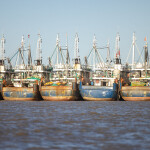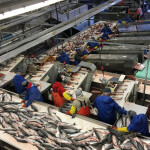While about 35 countries have limited imports of Japanese seafood due to radiation fears, the approaches taken have varied from outright bans to increased monitoring.
India adopted a three-month ban on all imports of Japanese foods, but may amend this when more reliable data is available. Russia suspended seafood imports from 242 Japanese plants located in affected areas.
The US Food and Drug Administration ruled that Japanese seafood may be sold to the public after being sampled and screened for radiation, and Canada has adopted a similar strategy. The European Union requires radiation testing for food produced in Fukushima and 11 nearby prefectures, while a certificate of origin issued by the Japanese government is required for products from other prefectures.
China also demands a certificate of origin from the national government, but goes further, banning the import of food originating in the 12 prefectures, while requiring the Japanese government to issue a document certifying that foods from other prefectures are free from harmful levels of radiation. China has also asked importers of Japanese food products to establish a tracking system for imports for use in possible recalls.
As Japan currently has no central government agency that issues certificates of origin or of radiation-free status, this requirement has effectively blocked all seafood imports to China. It had asked China to instead accept certificates of origin issued by local governments and documents from private inspection organizations that certify food items do not contain radiation above allowed levels. After the two sides failed to agree, the Japanese Ministry of Agriculture, Forestry and Fisheries announced last week that it is considering which agencies might issue such documents.
Consumer fears seem to be having as much effect on trade as actual contamination. Japanese television reported that juvenile sardines caught last year, before the quake and tsunami, and held in storage in Ibaraki Prefecture were unsalable, as buyers reject all seafood caught in the prefecture following the discovery of sand lance with unsafe levels of radioactive particles cesium-137 and iodine-131.
Many Koreans are avoiding seafood caught in their local waters, due to its proximity to Japan, though the Japanese islands block entry of contaminated water. Korea is replacing items usually imported from Japan with Chinese product, while Japan is also turning to China. A Chinese seafood industry group reported a shortage of hands and tight cold storage capacity since mid-March due to rising demand for frozen seafood from Japan.
Taiwan has announced it will step up testing of catches from its own fishing fleet, as Taiwanese vessels often fish off the coast of Japan, particularly during the Pacific saury season at the end of summer.






